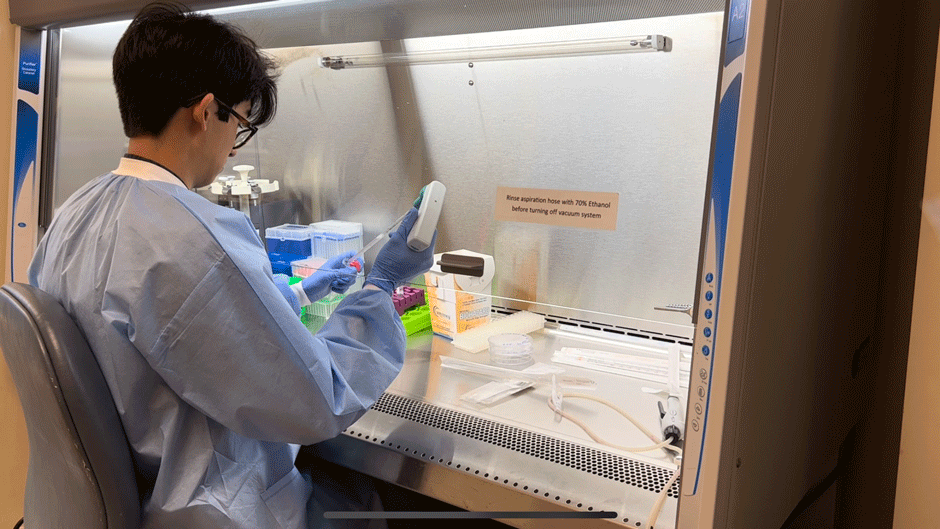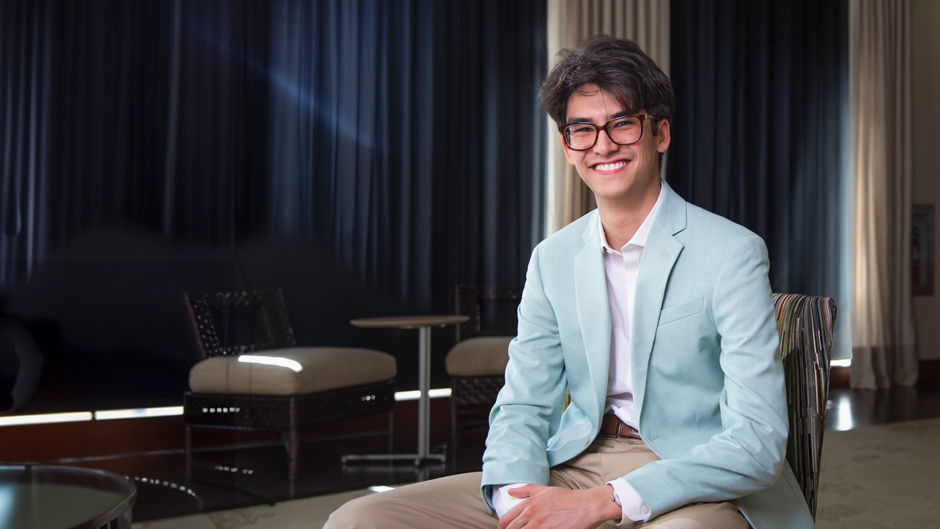When Ethan Tieu was in the seventh grade, his fascination with research began.
He had just learned about mitochondria as the body’s source of energy when he was assigned a science fair project.
Tieu decided to put what he had learned to use. He would investigate where the most mitochondria were found in a chicken. So, Tieu bought a raw chicken and took it to his father’s lab. He learned how to assess the concentration of mitochondrial proteins and discovered that most are clustered in the thigh. The experiment was simple, but it opened up a new world to Tieu.
“Research is about creativity of thought for me,” said Tieu, now a sophomore at the University of Miami studying neuroscience and computer science. “In middle school, I knew no one had investigated this, and it was something that came to me in a flow of consciousness that manifested into a hands-on project. Now, I just love the explorative aspects of it.”
Tieu’s passion for science attracted him to the University because of its status as a top-tier research institution. He now spends about 20 hours a week working in two labs based at the Miller School of Medicine. Recently, Tieu was named a Goldwater Scholar, an honor offered to just over 400 college sophomores and juniors across the nation. It is one of the most prestigious scholarships in the United States for students who aim to pursue research careers in science, math, or engineering, and is supported by the U.S. Department of Defense. It’s also the second year in a row that a University student has achieved the honor.
“This award is the gold standard for undergraduates considering careers in STEM research,” said Erika Liberus, director for prestigious awards and fellowships at the Office of Academic Enhancement. “Ethan’s experiences and future plans fit the bill. As a sophomore, he already has an impressive research history, and a clear vision for how he’d like to make new and important strides in neuroscience. We’re extremely proud of his accomplishment.”

Tieu began his research training before coming to the University, where he is also a Stamps Scholar. In high school and during summers, Tieu worked in two neuroscience labs at Florida International University. That prepared him to join Dr. Stephan Züchner’s CMT Genetics lab at the Miller School during his first year at the University.
As part of the lab, Tieu has learned a great deal about Charcot-Marie-Tooth diseases, or CMT, a group of neurological disorders that are among the most common inherited genetic mutations. To those affected by CMT, it damages the peripheral nerves, which transmit information from the brain to the arms and legs. This means people with CMT have a hard time walking, buttoning their own shirt, or moving their arms and hands properly.
“People afflicted with CMT are often left with very little options in terms of therapy since there is very little research in this field. So when people are diagnosed, we get emails from patients directly,” Tieu said. “A lot of these patients just get treatment to live out the rest of their days, and many are wheelchair-bound because their nerves aren’t functioning properly.”
Züchner’s lab is trying to look for therapies for CMT patients. For the past year, Tieu has helped develop an animal model of the disease that can help shed light on its progression. Ideally, this will also be used to create therapies to reverse the effects of CMT. Their findings were published recently in the medical journal, Brain.
“We still don’t really understand why humans get this disorder and what happens in the nerves, so these models could be invaluable,” said Züchner, a professor of human genetics and neurology, as well as the Miller School’s chief genomics officer. “Ethan was really helpful and often came in additional hours to work on this project. He is a very rare student with great potential.”
But after his first year at the University and in the lab, Tieu also recognized the importance of using computer science and artificial intelligence to help advance medical research. Now, Tieu is also pursuing a degree in computer science, and is applying these skills in a second lab at The Miami Project to Cure Paralysis that is focused on computational neuroscience.
He hopes to use the Goldwater scholarship to support research projects that will merge his two interests—helping patients with conditions that stem from the brain and using computing to develop therapies faster for neurodegenerative diseases, like Alzheimer’s disease and other memory disorders.
“The goal is to use biological models and resources from the lab, develop data from them, and use computing techniques like machine learning to expedite potential therapies,” he said. “There’s a huge future in the melding of these two fields to accelerate research and devise innovative solutions to problems that humans may not even think of themselves.”
However, Tieu doesn’t spend all his time in a lab or in front of a computer. In 2020 he founded his own educational initiative, Tieu Tunes, where he offers virtual violin lessons each week to help address the lack of music education in Kenya and Tanzania. As part of this project, he has also been working to create and 3D-print violins for his students. He tests the quality of the violins in his dorm room, and then has them printed in Africa.
“It started as a passion project in high school, and then the momentum kept building,” he said. “Hearing students talk about what they have gained from the program is huge, so I love doing it.”
On campus, Tieu is also a First Year Fellow, offering academic advising to new Hurricanes in Mahoney Residential College. He is also the incoming president of Inspire U, a mentoring group for students at Booker T. Washington High School in downtown Miami. And with two friends from computer science, Tieu recently founded BonsAI, an applied computations group created to help fast track data science research projects using machine learning.
Tieu hopes to eventually become a physician scientist, both seeing patients and doing neurological research to develop new therapeutics or treatments. He was inspired by a few of his mentors at the University, Züchner and Dr. Mario Saporta, an associate clinical professor of neurology.
“There’s a need for research that bridges the gap between research and medicine,” Tieu said. “I want the deep clinical understanding that comes with an M.D., and I want the academic training and understanding that comes with a Ph.D. By having a greater understanding of treatments that can be applied safely to patients, I will be able to direct my research efforts toward more effective therapies.”

